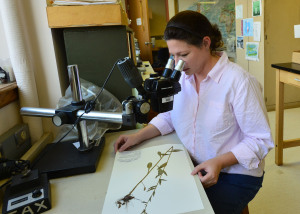The Marshall University (MU) herbarium is playing a key role in a National Science Foundation-funded effort to digitize collections that chronicle a global hotspot of plant diversity in the southeastern United States. The Marshall University Herbarium is located on the third floor of the Science Building and is directed by Dr. Emily Gillespie, an assistant professor in the Department of Biological Sciences.

In all, the NSF awarded six grants this year totaling approximately $7.5 million to digitize biodiversity collections, a nationwide effort coordinated by the iDigBio (www.idigbio.org) program based at the University of Florida. MU has united with dozens of other southeastern universities in a Thematic Collections Network project entitled “The Key to the Cabinets: Building and Sustaining a Research Database for a Global Biodiversity Hotspot.” The digitization will make the collections at MU and its partner institution in West Virginia (WVU) instantly accessible to anyone with Internet access. Appalachian State University, in Boone, North Carolina, is the lead institution for this regional collaborative effort.
The MU herbarium, which houses West Virginia’s second-largest collection of dried plant specimens, received $138,795 from the National Science Foundation to direct West Virginia’s part of a four-year, 12-state initiative. The effort will develop an imaged and databased set of more than 3 million of the estimated 15 million southeastern U.S. specimens from 107 herbaria in the region.
With these funds, Gillespie said, “We will build collaboration among four important communities. The four communities are 1) the scientists working with the collections and their students, 2) affiliates who use the herbaria in their day-to-day work, such as conservation biologists, 3) information technologists who will build the data pipeline to move information and facilitate communication, and 4) citizen scientists who will gain virtual access to the collections and the working scientists via this data pipeline.”
“In building collaboration among these communities, we will be exploring methods to engage citizen scientists in the process of doing science,” Gillespie said. “The data generated through this effort will be of significant value in basic fields of biology, such as ecology and evolution, as well as in applied areas of conservation and regional planning. Ultimately, we intend to use the information gained from these community interactions to inform other scientific efforts on ways to give the public opportunities to do science and have a real impact on the world around them.”
For more information, contact Gillespie at 304-696-6467, or by e-mail at gillespiee@marshall.edu.